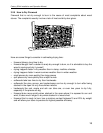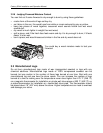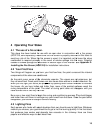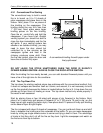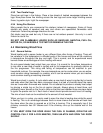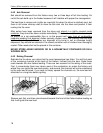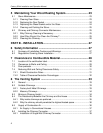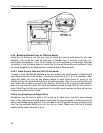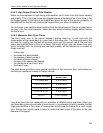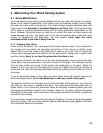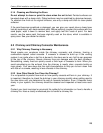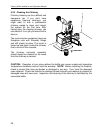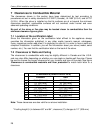
Century S244 Installation and Operation Manual
21
4.4.6.3 High Output Fires for Cold Weather
When the heat demand is high during cold weather, you’ll need a fire that burns steadily
and brightly. This is the time to use your biggest pieces of hardwood fuel if you have it. Put
the biggest pieces at the back of the firebox and place the rest of the pieces compactly. A
densely built fire like this will produce the longest burn your stove is capable of.
You will need to be cautious when building fires like this because if the air is turned down
too much, the fire could smoulder. Make sure the wood is flaming brightly before leaving
the fire to burn.
4.4.6.4 Maximum Burn Cycle Times
The burn cycle time is the period between loading wood on a coal bed and the
consumption of that wood back to a coal bed of the same size. The flaming phase of the
fire lasts for roughly the first half of the burn cycle and the second half is the coal bed
phase during which there is little or no flame. The length of burn you can expect from your
stove, including both the flaming and coal bed phases, will be affected by a number of
things, such as:
•
firebox size,
•
the amount of wood loaded,
•
the species of wood you burn,
•
the wood moisture content,
•
the size of the space to be heated,
•
the climate zone you live in, and
•
the time of year.
The table below provides a very general indication of the maximum burn cycle times you
are likely to experience, based on firebox volume.
FIREBOX VOLUME
MAXIMUM
BURN TIME
<1.5 cubic feet 3 to 5 hours
1.5 c.f. to 2.0 c.f 5 to 6 hours
2.0 c.f. to 2.5 c.f. 6 to 8 hours
2.5 c.f. to 3.0 c.f. 8 to 9 hours
>3.0 c.f. 9 to 10 hours
Long burn times are not necessarily an indication of efficient stove operation. When you
are home during the day and able to tend the fire, it is preferable to build a smaller fire that
might provide three or four hours of heating than to fully load the firebox for a much longer
burn. Shorter burn cycles make it easier to match the heat output of the stove to the heat
demand of the space.



